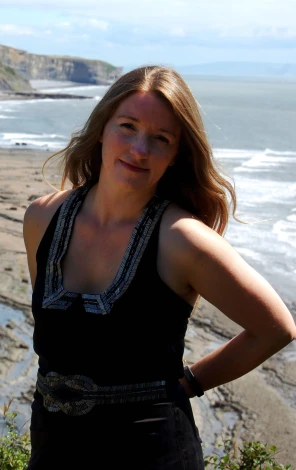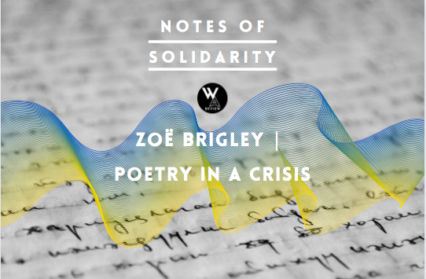Notes of Solidarity is a new daily series of mini-essays, poems, and reflections on the Russian war on Ukraine by some of Wales’s leading literary figures. Here, poet and writer Zoë Brigley writes on the power of poetry to offer evocative reflection and warning in the midst of a phenomenal crisis.

It’s almost a year since we published the anthology, 100 Poems to Save the Earth, and it feels like more than ever the world needs saving. In my recent editorial for Poetry Wales, I register that I did not expect to be writing in the light of the monumental event of the Russian invasion, as Ukrainian cities are being shelled and bombed. Maybe the opposite of nature is war, because even while nature – it’s true – contains violence, it is human beings who have invented new forms of horror: the vacuum bomb, nuclear weapons, and other elaborate ways of maiming, killing, and exterminating each other and all life around us.
In 100 Poems to Save the Earth, there are two poems I turn back to, which register the horror of war. First is a poem by Mir Mahfuz Ali, ‘MIG-21 Raids at Shegontola,’ which tells the story of a child who witnesses his village being bombed.
The slow begonias rattle
their scarlet like confetti.
Metal slashes
the trees and ricochets.
Wires and pipes snap
at the roots, quiver.
John Glenday has praised the poem for its ‘a moral stance, to act as a redemptive force, rescuing the individual from history’. Perhaps that is what the best writing in wartime does.
The companion poem to Mir Mahfuz Ali in 100 Poems to Save the Earth is ‘Eurofighter Typhoon’ by Fiona Benson, which describes the unease of a mother, as military planes fly over her garden where her children play.
and now its grey belly’s right over our house
with a metallic, grinding scream
like the sky’s being chainsawed open
and the baby’s face drops to a square of pure fear,
she tips forward and flattens her body on the ground
Benson captures the horror of the moment in the child’s reaction, reminding us that some injuries are of the mind as well as the body in war. We included these poems in the anthology, because it is more and more likely that, as climate emergency worsens, countries will begin international conflicts and wars.
In the meantime, we need to be lifting the voices of Ukrainian writers, like Ilya Kaminsky who writes about being a Ukrainian poet living in the US, a country that has also bombed civilians for example in the Middle East. Ilya Kaminsky comments in an interview on conflict and the meaning of his poem ‘We Lived Happily During the War’. He suggests the role of poetry as a witness of atrocities and a call to action:
The poem doesn’t want to be a pronouncement. The poem is a warning. This is what happens when half-measures take place. “We lived happily during the war,” the poem begins, and it ends with the same words. But by the time it gets to its final line, one hopes the reader might find the horrific irony in that fact of repetition. How many wars can we live through, happily?
For more information on the Russia-Ukraine war, including ways you can help, please click here.
You can follow all contributions to Notes of Solidarity from Wales Arts Review here.
To find out more about Zoë Brigley visit her website.
_______________________________________________________________________
Recommended for you:
For the latest in our Writers’ Rooms series, poet, essayist and academic Zoë Brigley invites us into her workspace in her home in Ohio. Brigley’s books can be found at Bloodaxe Books.
_______________________________________________________________________











